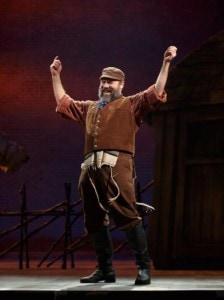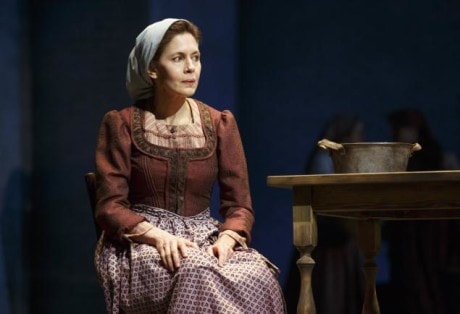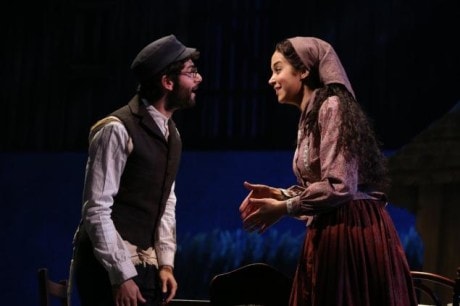I am so glad that Sheldon Harnick, the last surviving member of the creative team of the original production of Fiddler on the Roof, has been able to participate in this glorious revisical. His late collaborators (Jerry Bock, Jerome Robbins, and Joseph Stein) would, I’m certain, have been thrilled at the reception given this latest production of their classic musical.

Bartlett Sher is at the helm this time, and he’s once again brought a fresh directorial eye to material we all cherish. In recent seasons he has magically tweaked South Pacific and The King and I along with Adam Guettel’s The Light in the Piazza, so now it’s an established fact that he has the ability to package the old as well as the new with the eye of an artist so they emerge as newly minted and potent.
Sher has respect for the past. He uses what his predecessors left behind when their versions of Fiddler closed. The show’s original eight year run ended in 1972, and this is its fourth revival on Broadway. For me, it retains the luster of the original and is much more faithful to it than was the more recent attempt in which Alfred Molina and later Harvey Fierstein played Tevye under the direction of David Levaux. We don’t have here the iconic performance of Zero Mostel who first played the character created by Sholem Aleichem in a short story.
But in the marvelously appealing Danny Burstein we have a “little guy” who is clearly head of his family, a milkman with a wife and five daughters whom he adores, but a little man with big dreams who feels the presence of God in his daily life so strongly that he enjoys conversing with Him, asking for guidance in the raising of his daughters and discussing his wish for a little help in the financial department. When he asks if it would vastly disturb some major plan to make him a rich man, he makes us laugh, but there is enough gravitas in his question to endear him to us. Burstein has always brought weight to his characterizations and here he finds a role that allows full range to his acting chops. He’s the proud poppa but it isn’t he alone who carries this production on his broad shoulders.
His life’s partner Golde, as played by Jessica Hecht, is also a fully-realized woman who at first seems formidable as she very well manages raising five girls and the running of a home. She’s a tough old bird and she doesn’t laugh a lot, but she accepts her lot with gratitude, and when asked by Tevye if she loves him, gives it much thought before answering: “I suppose I do.” As Ms. Hecht plays it, it’s magical.

For the rest, all is well. The five daughters are well played, but it’s Hodel, Chava, and Tzeitel who have the best material, and each takes the stage when it’s her turn. As a trio they perform “Matchmaker” superbly and bring sunshine to the gloom that often settles over their shtetl in the Russia of 1910. They are matched by the three disparate gents who are their suitors.
Motel the tailor is loosely limbed Adam Kantor. In “Miracle of Miracles” his joy is abundant and he shares it with us, making it infectious. Perchik, the student, is played with feeling by Ben Rappaport. His growing love for Hodel is subtly played and it explodes with “Now I Have Everything” which gets the darker second act off on a bright note. And Fyedka, the Russian gentile, is in very capable hands with Nick Rehberger, a “proud graduate of Carnegie Melon School of Drama” who manages to woo and win Chava with no musical number to call his own. Alix Korey plays the very busy matchmaker “Yente”, babbling delightfully in several monologues in which she raises questions that she always seems to answer herself.
Hofesh Shechter has made good use of Jerome Robbins’ choreography, but he has added and diminished with respect for the original work. The Bottle Dance was always an exciting section but it is even more so now that a new and gifted talent has had his way with it. There may be some quibbling over the staging of the Sabbath Prayer but it remains eloquent and moving.

Some consider Fiddler has a tragic ending, for its story covers the end of an era, the collapse of a tradition that has bound its people for generations. But I’ve always felt this departure from Anatevka, the small village that has been home to these people, has in it the hope of a new life at least for those who managed to come to America to begin anew. Tevye and his family, splintered by circumstance, will not disappear.
As Danny Burstein lifts the handles of his milk cart, now loaded with the few things they are taking with them, he lifts his head, the wheels turn and he and his family join the long parade of displaced persons. Tears come once again, but for me they were tears of relief that this family, and others like them, will have another chance, will survive, will even thrive. The Fiddler himself, he who played while perched precariously on a roof, will go with them, and I like to think he will play again in a more hospitable land.
Running Time: Two hours and 45 minutes, including one intermission.
Fiddler on the Roof is playing at the Broadway Theatre – 1681 Broadway (Between West 52nd and 53rd Streets) in New York City. For tickets, purchase them at the box office, call Telecharge at (212) 239-6200, or purchase them online.




